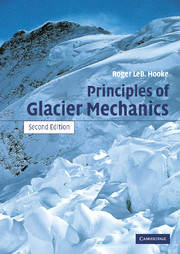Book contents
- Frontmatter
- Contents
- Preface to the first edition
- Preface to the second edition
- Physical constants relevant to ice
- Derived SI units and conversion factors
- 1 Why study glaciers?
- 2 Some basic concepts
- 3 Mass balance
- 4 Flow and fracture of a crystalline material
- 5 The velocity field in a glacier
- 6 Temperature distribution in polar ice sheets
- 7 The coupling between a glacier and its bed
- 8 Water flow in and under glaciers: geomorphic implications
- 9 Stress and deformation
- 10 Stress and velocity distribution in an idealized glacier
- 11 Numerical modeling
- 12 Applications of stress and deformation principles to classical problems
- 13 Finite strain and the origin of foliation
- 14 Response of glaciers to changes in mass balance
- Appendix: Problems
- References
- Index
1 - Why study glaciers?
Published online by Cambridge University Press: 24 November 2009
- Frontmatter
- Contents
- Preface to the first edition
- Preface to the second edition
- Physical constants relevant to ice
- Derived SI units and conversion factors
- 1 Why study glaciers?
- 2 Some basic concepts
- 3 Mass balance
- 4 Flow and fracture of a crystalline material
- 5 The velocity field in a glacier
- 6 Temperature distribution in polar ice sheets
- 7 The coupling between a glacier and its bed
- 8 Water flow in and under glaciers: geomorphic implications
- 9 Stress and deformation
- 10 Stress and velocity distribution in an idealized glacier
- 11 Numerical modeling
- 12 Applications of stress and deformation principles to classical problems
- 13 Finite strain and the origin of foliation
- 14 Response of glaciers to changes in mass balance
- Appendix: Problems
- References
- Index
Summary
Before delving into the mathematical intricacies with which much of this book is concerned, one might well ask why we are pursuing this topic – glacier mechanics? For many who would like to understand how glaciers move, how they sculpt the landscape, how they respond to climatic change, mathematics does not come easily. I assure you that all of us have to think carefully about the meaning of the expressions that seem so simple to write out but so difficult to understand. Only then do they become part of our vocabulary, and only then can we make use of the added precision which mathematical analysis, properly formulated, is able to bring. Is it worth the effort? That depends upon your objectives; on why you chose to study glaciers.
There are many reasons, of course. Some are personal, some academic, and some socially significant. To me, the personal reasons are among the most important: glaciers occur in spectacular areas, often remote, that have not been scarred by human activities. Through glaciology, I have had the opportunity to live in these areas; to drift silently in a kayak on an ice-dammed lake in front of our camp as sunset gradually merges with sunrise on an August evening; to marvel at the northern lights while out on a short ski tour before bedtime on a December night; and to reflect on the meaning of life and of our place in nature.
- Type
- Chapter
- Information
- Principles of Glacier Mechanics , pp. 1 - 4Publisher: Cambridge University PressPrint publication year: 2005



